Our workshops are interactive, engaging, and enable you to immediately apply what you learn in the real world.
Rather than relying on drawn-out lectures, our Fellows and Scholars  encourage consistent participation. Attendees will be reading, writing, and discussing ideas with one another as they apply critical thinking concepts to their subjects, professions, and personal lives. You will engage in whole-group discussions and breakout room activities with smaller groups, and will have ample time to ask questions and explore the critical thinking ideas, tools, and applications being discussed in every session.
encourage consistent participation. Attendees will be reading, writing, and discussing ideas with one another as they apply critical thinking concepts to their subjects, professions, and personal lives. You will engage in whole-group discussions and breakout room activities with smaller groups, and will have ample time to ask questions and explore the critical thinking ideas, tools, and applications being discussed in every session.
All participants will have complimentary access to the Center for Critical Thinking Community Online during these workshops.
Some workshops run for a full six hours, while others are split, with three hours occuring on one day and another three occuring the next. Both formats include breaks.
Some workshops are scheduled to occur only once, while others are scheduled to take place twice.
'Do my colleagues and I need critical thinking?'
We all do. Read why.
{"id":"4861","title":"","author":"","content":"<p><span style=\"font-family: arial, helvetica, sans-serif; font-size: medium;\">Our workshops are interactive, engaging, and enable you to immediately apply what you learn in the real world.</span><br /><br /><span style=\"font-family: arial, helvetica, sans-serif; font-size: medium;\">Rather than relying on drawn-out lectures, our Fellows and Scholars </span><span style=\"font-family: arial, helvetica, sans-serif; font-size: medium;\"><img style=\"margin-left: 10px; margin-top: 5px; margin-bottom: 5px; float: right;\" src=\"https://www.criticalthinking.org/data/courses/two_women_in_front_of_silver_macbook_1181723_1.jpg\" alt=\"\" width=\"333\" height=\"221\" /></span><span style=\"font-family: arial, helvetica, sans-serif; font-size: medium;\">encourage </span><span style=\"font-family: arial, helvetica, sans-serif; font-size: medium;\">consistent participation. Attendees </span><span style=\"font-family: arial, helvetica, sans-serif; font-size: medium;\"><span style=\"font-family: arial, helvetica, sans-serif; font-size: medium;\">will b</span></span><span style=\"font-family: arial, helvetica, sans-serif; font-size: medium;\"><span style=\"font-family: arial, helvetica, sans-serif; font-size: medium;\">e reading, writing, and discussing ideas with one </span></span><span style=\"font-family: arial, helvetica, sans-serif; font-size: medium;\"><span style=\"font-family: arial, helvetica, sans-serif; font-size: medium;\">another as they apply critical thinking concepts to their </span></span><span style=\"font-family: arial, helvetica, sans-serif; font-size: medium;\"><span style=\"font-family: arial, helvetica, sans-serif; font-size: medium;\">subjects, professions, and personal lives. You</span> will engage in whole-group discussions and breakout room activities with smaller groups, and will have ample time to ask questions and explore the critical thinking ideas, tools, and applications being discussed in every session. </span></p>\r\n<p><span style=\"font-family: arial, helvetica, sans-serif; font-size: medium;\"><strong>All participants will have complimentary access to the</strong> <a href=\"https://community.criticalthinking.org/\" target=\"_blank\"><strong><span style=\"text-decoration: underline;\">Center for Critical Thinking Community Online</span></strong></a> <strong>during these workshops.</strong><br /></span></p>\r\n<p><span style=\"font-family: arial, helvetica, sans-serif; font-size: medium;\">Some workshops run for a full six hours, while others are split, with three hours occuring on one day and another three occuring the next. Both formats include breaks.</span></p>\r\n<p><span style=\"font-family: arial, helvetica, sans-serif; font-size: medium;\">Some workshops are scheduled to occur only once, while others are scheduled to take place twice.</span><strong></strong></p>\r\n<p style=\"text-align: center;\"><strong><span style=\"font-family: arial, helvetica, sans-serif; font-size: large;\"><br />'Do my colleagues and I need critical thinking?'</span></strong></p>\r\n<p style=\"text-align: center;\"><span style=\"font-family: arial, helvetica, sans-serif; font-size: medium;\"><strong><span style=\"font-size: large;\">We all do. <a href=\"#accelerating-change-and-complexity\" target=\"_blank\"><span style=\"text-decoration: underline;\">Read why</span>.</a></span></strong><br /></span></p>","public_access":"1","public_downloads":"0","sku":"","files":[],"images":[]}
Higher Education
Foundations of Critical Thinking: Placing Critical Thinking at the Core of Higher Education… Dr. Gerald Nosich
1. Saturday & Sunday February 13-14 6:00 p.m. - 9:00 p.m. EST
2. Saturday & Sunday May 15-16 6:00 p.m. - 9:00 p.m. EDT
Times Include Short Breaks
A key insight into content, and into thinking, is that all content represents a distinctive mode of thinking. Math becomes more intelligible as one learns to think mathematically. Biology becomes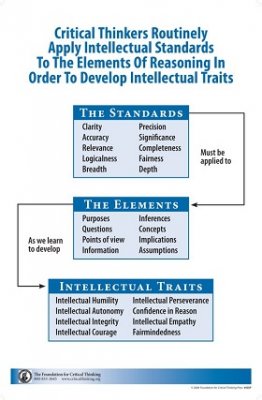 more intelligible as one learns to think biologically. History becomes more intelligible as one learns to think historically. This is true because all subjects are generated by thinking, organized by thinking, analyzed by thinking, synthesized by thinking, expressed by thinking, evaluated by thinking, restructured by thinking, maintained by thinking, transformed by thinking, learned by thinking, understood by thinking, and applied by thinking. If you try to take the thinking out of content, you have only empty words remaining, for it is thinking itself, on the part of the student, that gives life to content.
more intelligible as one learns to think biologically. History becomes more intelligible as one learns to think historically. This is true because all subjects are generated by thinking, organized by thinking, analyzed by thinking, synthesized by thinking, expressed by thinking, evaluated by thinking, restructured by thinking, maintained by thinking, transformed by thinking, learned by thinking, understood by thinking, and applied by thinking. If you try to take the thinking out of content, you have only empty words remaining, for it is thinking itself, on the part of the student, that gives life to content.
Learning a unique system of ideas is the key to learning any content whatsoever. In this session, we will explore the intimate relationship between content and thinking, and will argue for the importance of placing explicit critical thinking concepts and principles at the very heart of teaching and learning in higher education.
This workshop, which focuses on the analysis and assessment of thought, is part one of our two-part series, the second of which focuses on additional core concepts in critical thinking, namely the importance of intellectual virtues in cultivating the mind, and the barriers to criticality that all humans face.
All participants will have complimentary access to the Center for Critical Thinking Community Online during this workshop.
{"id":"4839","title":"Foundations of Critical Thinking: Placing Critical Thinking at the Core of Higher Education… Dr. Gerald Nosich","author":"","content":"<ol> </ol>\r\n<p style=\"text-align: center;\"><span style=\"font-size: large;\"><span style=\"color: #333399;\"><strong><span style=\"font-family: times new roman, times;\">1. Saturday & Sunday February 13-14 6:00 p.m. - 9:00 p.m.</span></strong></span><span style=\"color: #333399;\"><strong><span style=\"font-family: times new roman, times;\"> EST</span></strong></span></span></p>\r\n<p style=\"text-align: center;\"><span style=\"color: #333399; font-size: large;\"><strong><span style=\"font-family: times new roman, times;\">2. </span></strong></span><span style=\"color: #333399;\"><strong><span style=\"font-size: large; font-family: times new roman, times;\"><strong><span style=\"font-family: times new roman, times;\">Saturday & Sunday May 15-16 6:00 p.m. - 9:00 p.m.</span></strong><span style=\"color: #333399;\"><strong><span style=\"font-size: large; font-family: times new roman, times;\"> EDT</span></strong></span></span></strong></span></p>\r\n<p style=\"text-align: center;\"><br /><span style=\"color: #333399;\"><strong><span style=\"font-size: large; font-family: times new roman, times;\"><span style=\"color: #333399;\"><strong><span style=\"font-size: large; font-family: times new roman, times;\"><span style=\"color: #333399;\"><strong><span style=\"font-size: large; font-family: times new roman, times;\"><span style=\"color: #333399;\"><strong><span style=\"font-size: large; font-family: times new roman, times;\">Times Include Short Breaks</span></strong></span></span></strong></span></span></strong></span></span></strong></span></p>\r\n<p><span style=\"font-size: large; font-family: times new roman, times;\"><br />A key insight into content, and into thinking, is that all content represents a distinctive mode of thinking. Math becomes more </span><span style=\"font-size: large; font-family: times new roman, times;\">intelligible as one learns to think mathematically. Biology becomes</span><span style=\"font-size: large; font-family: times new roman, times;\"><img style=\"margin-left: 10px; margin-top: 5px; margin-bottom: 5px; float: right;\" src=\"https://www.criticalthinking.org/data/courses/Elmnts_Stndrds_Traits_Diagram_1.jpg\" alt=\"\" width=\"262\" height=\"400\" /></span><span style=\"font-size: large; font-family: times new roman, times;\"> more intelligible as one learns to think biologically. History becomes more intelligible as one learns to think historically. This is true because all subjects are generated by thinking, organized by thinking, analyzed by thinking, synthesized by thinking, expressed by thinking, evaluated by thinking, restructured by thinking, maintained by thinking, transformed by thinking, learned by thinking, understood by thinking, and applied by thinking. If you try to take the thinking out of content, you have only empty words remaining, for it is thinking itself, on the part of the student, that gives life to content. </span><br /><br /><span style=\"font-size: large; font-family: times new roman, times;\">Learning a unique system of ideas is the key to learning any content whatsoever. In this session, we will explore the intimate relationship between content and thinking, and will argue for the importance of placing explicit critical thinking concepts and principles at the very heart of teaching and learning in higher education. </span><br /><br /><span style=\"font-size: large; font-family: times new roman, times;\">This workshop, which focuses on the analysis and assessment of thought, is part one of our two-part series, the second of which focuses on additional core concepts in critical thinking, namely the importance of intellectual virtues in cultivating the mind, and the barriers to criticality that all humans face.</span></p>\r\n<p><span style=\"font-size: large; font-family: times new roman, times;\"><span style=\"font-size: large; font-family: times new roman, times;\"><span style=\"font-size: large; font-family: times new roman, times;\">All participants will have complimentary access to the <strong><span style=\"text-decoration: underline;\"><a href=\"https://community.criticalthinking.org/\" target=\"_blank\">Center for Critical Thinking Community Online</a></span></strong> during this workshop.</span></span></span></p>","public_access":"1","public_downloads":"0","sku":"","files":[],"images":[]}
For Administrators: Placing a Robust Framework for Critical Thinking at the Heart of Your Institution’s Mission, Accreditation or Reaccreditation Process… Dr. Paul Bankes
Thursday February 18 2:00 p.m. - 8:00 p.m. EST
Times Include Short Breaks & 1-Hour Meal Break
Critical thinking is not an isolated goal unrelated to other important goals in education. Rather, it is a seminal goal which, done well, simultaneously facilitates a rainbow of other ends. It is best conceived, therefore, as the hub around which all other educational ends cluster. For example, as students learn to think more critically, they become more proficient at historical, scientific, and sociological thinking. They develop skills, abilities, and values critical to success in everyday life. All of this assumes, of course, that those who teach have a solid grounding in critical thinking and in the teaching strategies essential to it.
 To develop a deep understanding of the foundations of critical thinking involves a long-term approach to learning and applying those foundations. Faculty in a long-range professional development program come to recognize explicitly that critical thinking is not just one of many divergent educational aims, but is rather a way of teaching and learning at a high level of effectiveness. This workshop will thus focus on a substantive, robust framework for critical thinking and how it can be placed at the heart of the institution’s mission, accreditation, or reaccreditation process. A long-term approach to staff development will be emphasized.
To develop a deep understanding of the foundations of critical thinking involves a long-term approach to learning and applying those foundations. Faculty in a long-range professional development program come to recognize explicitly that critical thinking is not just one of many divergent educational aims, but is rather a way of teaching and learning at a high level of effectiveness. This workshop will thus focus on a substantive, robust framework for critical thinking and how it can be placed at the heart of the institution’s mission, accreditation, or reaccreditation process. A long-term approach to staff development will be emphasized.
All participants will have complimentary access to the Center for Critical Thinking Community Online during this workshop.
{"id":"4844","title":"For Administrators: Placing a Robust Framework for Critical Thinking at the Heart of Your Institution’s Mission, Accreditation or Reaccreditation Process… Dr. Paul Bankes","author":"","content":"<ul>\r\n</ul>\r\n<p style=\"text-align: center;\"><span style=\"font-size: x-large;\"><span style=\"font-size: large;\"><strong><span style=\"font-family: times new roman, times; color: #333399;\">Thursday February 18 </span></strong><span style=\"color: #333399;\"><strong><span style=\"font-family: times new roman, times;\">2:00 p.m. - 8:00 p.m.</span></strong></span></span><span style=\"color: #333399;\"><strong><span style=\"font-family: times new roman, times;\"><span style=\"font-size: large;\"> EST</span></span></strong></span></span></p>\r\n<p style=\"text-align: center;\"><span style=\"font-size: x-large;\"><span style=\"color: #333399;\"><strong><span style=\"font-family: times new roman, times;\"><span style=\"font-size: large;\"><span style=\"color: #333399;\"><strong><span style=\"font-size: large; font-family: times new roman, times;\"><span style=\"color: #333399;\"><strong><span style=\"font-size: large; font-family: times new roman, times;\"><span style=\"color: #333399;\"><strong><span style=\"font-size: large; font-family: times new roman, times;\"><span style=\"color: #333399;\"><strong><span style=\"font-size: large; font-family: times new roman, times;\">Times Include Short Breaks & 1-Hour Meal Break</span></strong></span></span></strong></span></span></strong></span></span></strong></span></span></span></strong></span></span></p>\r\n<p style=\"text-align: center;\"><span style=\"font-size: x-large;\"><span style=\"color: #333399;\"><strong><span style=\"font-family: times new roman, times;\"><span style=\"font-size: large;\"><span style=\"color: #333399;\"><strong><span style=\"font-size: large; font-family: times new roman, times;\"><span style=\"color: #333399;\"><strong><span style=\"font-size: large; font-family: times new roman, times;\"><span style=\"color: #333399;\"><strong><span style=\"font-size: large; font-family: times new roman, times;\"><span style=\"color: #333399;\"><strong><span style=\"font-size: large; font-family: times new roman, times;\"><br /></span></strong></span></span></strong></span></span></strong></span></span></strong></span></span></span></strong></span></span></p>\r\n<p><span style=\"font-size: large; font-family: times new roman, times;\">Critical thinking is not an isolated goal unrelated to other important goals in education. Rather, it is a seminal goal which, done well, simultaneously facilitates a rainbow of other ends. It is best conceived, therefore, as the hub around which all other educational ends cluster. For example, as students learn to think more critically, they become more proficient at historical, scientific, and sociological thinking. They develop skills, abilities, and values critical to success in everyday life. All of this assumes, of course, that those who teach have a solid grounding in critical thinking and in the teaching strategies essential to it.</span></p>\r\n<p> <br /><span style=\"font-size: large; font-family: times new roman, times;\"><img style=\"float: left; margin-right: 10px; margin-top: 5px; margin-bottom: 5px;\" src=\"https://www.criticalthinking.org/data/courses/man_drinking_coffee_while_talking_on_the_phone_3874041_1.jpg\" alt=\"\" width=\"325\" height=\"216\" />To develop a deep understanding of the foundations of critical thinking involves a long-term approach to learning and applying those foundations. Faculty in a long-range professional development program come to recognize explicitly that critical thinking is not just one of many divergent educational aims, but is rather a way of teaching and learning at a high level of effectiveness. This workshop will thus focus on a substantive, robust framework for critical thinking and how it can be placed at the heart of the institution’s mission, accreditation, or reaccreditation process. A long-term approach to staff development will be emphasized.</span></p>\r\n<p><span style=\"font-size: large; font-family: times new roman, times;\"><span style=\"font-size: large; font-family: times new roman, times;\">All participants will have complimentary access to the <strong><span style=\"text-decoration: underline;\"><a href=\"https://community.criticalthinking.org/\" target=\"_blank\">Center for Critical Thinking Community Online</a></span></strong> during this workshop.</span></span></p>","public_access":"1","public_downloads":"0","sku":"","files":[],"images":[]}
Education at All Levels
Saturday March 13 2:00 p.m. - 8:00 p.m. EST
Times Include Short Breaks & 1-Hour Meal Break
Socratic questioning is disciplined questioning that can be used to pursue thought in many directions and for many purposes, including: to explore complex ideas, to get to the truth of things, to open up issues and problems, to uncover assumptions, to analyze concepts, to distinguish what we know from what we don’t know, and to follow out logical implications of thought. The key to 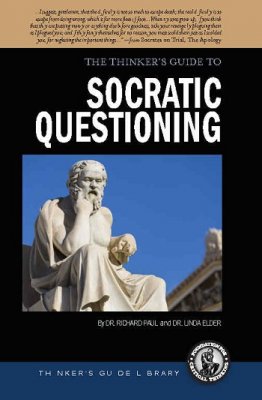 distinguishing Socratic questioning from questioning per se is that Socratic questioning is systematic, disciplined, and deep, and usually focuses on foundational concepts, principles, theories, issues, or problems.
distinguishing Socratic questioning from questioning per se is that Socratic questioning is systematic, disciplined, and deep, and usually focuses on foundational concepts, principles, theories, issues, or problems.
The art of Socratic questioning is intimately connected with critical thinking because the art of questioning is important to excellence of thought. What the word “Socratic” adds to the art of questioning is systematicity, depth, and an abiding interest in assessing the truth or plausibility of things. Critical thinkers not only ask questions, they ask deep, significant, unbiased questions.
Both critical thinking and Socratic questioning share a common end. Critical thinking provides the conceptual tools for understanding how the mind functions in its pursuit of meaning and truth; Socratic questioning employs those tools in framing questions essential to the pursuit of meaning and truth.
This session will include an introduction to the theory and practice of Socratic Questioning, through emphasis on the analysis and assessment of reasoning. Participants will be engaged in Socratic dialogue, and will gain introductory experience in Socratic questioning that, with practice, can lead to an increasingly richer understanding of the power inherent in disciplined questioning as a tool for teaching and learning.
All participants will have complimentary access to the Center for Critical Thinking Community Online during this workshop.
{"id":"4845","title":"Socratic Questioning Through the Tools of Critical Thinking… Dr. Gerald Nosich","author":"","content":"<p style=\"text-align: center;\"><span style=\"font-size: large;\"><span style=\"color: #333399;\"><strong><span style=\"font-family: times new roman, times;\">Saturday March 13 2</span></strong></span><span style=\"color: #333399;\"><strong><span style=\"font-family: times new roman, times;\">:00 p.m. - 8:00 p.m.</span></strong></span><span style=\"color: #333399;\"><strong><span style=\"font-family: times new roman, times;\"> EST</span></strong></span></span></p>\r\n<p style=\"text-align: center;\"><br /><span style=\"font-size: large;\"><span style=\"color: #333399;\"><strong><span style=\"font-family: times new roman, times;\"><span style=\"color: #333399;\"><strong><span style=\"font-size: large; font-family: times new roman, times;\"><span style=\"color: #333399;\"><strong><span style=\"font-size: large; font-family: times new roman, times;\"><span style=\"color: #333399;\"><strong><span style=\"font-size: large; font-family: times new roman, times;\"><span style=\"color: #333399;\"><strong><span style=\"font-size: large; font-family: times new roman, times;\">Times Include Short Breaks & 1-Hour Meal Break</span></strong></span></span></strong></span></span></strong></span></span></strong></span></span></strong></span></span><a href=\"https://www.criticalthinking.org/store/events/register_1.php?id=598\" target=\"_blank\"><br /></a></p>\r\n<p><span style=\"font-size: large; font-family: times new roman, times;\"><br /></span><span style=\"font-size: large; font-family: times new roman, times;\">Socratic questioning is disciplined questioning that can be used to pursue thought in many directions and for many purposes, including: to explore complex ideas, to get to the truth of things, to open up issues and problems, to uncover assumptions, to analyze concepts, to distinguish what we know from what we don’t know, and to follow out logical implications of thought. The key to </span><a href=\"https://www.criticalthinking.org/store/products/the-thinkers-guide-to-socratic-questioning/231\" target=\"_blank\"><span style=\"font-size: large; font-family: times new roman, times;\"><img style=\"margin-left: 10px; float: right; margin-top: 5px; margin-bottom: 5px;\" src=\"https://www.criticalthinking.org/data/courses/Socratic_Questioning_3.jpg\" alt=\"\" width=\"200\" height=\"305\" /></span></a><span style=\"font-size: large; font-family: times new roman, times;\">distinguishing Socratic questioning from questioning per se is that Socratic questioning is systematic, disciplined, and deep, and usually focuses on foundational concepts, principles, theories, issues, or problems.</span><br /><br /><span style=\"font-size: large; font-family: times new roman, times;\">The art of Socratic questioning is intimately connected with critical thinking because the art of questioning is important to excellence of thought. What the word “Socratic” adds to the art of questioning is systematicity, depth, and an abiding interest in assessing the truth or plausibility of things. Critical thinkers not only ask questions, they ask deep, significant, unbiased questions. </span><br /><br /><span style=\"font-size: large; font-family: times new roman, times;\">Both critical thinking and Socratic questioning share a common end. Critical thinking provides the conceptual tools for understanding how the mind functions in its pursuit of meaning and truth; Socratic questioning employs those tools in framing questions essential to the pursuit of meaning and truth. </span><br /><br /><span style=\"font-size: large; font-family: times new roman, times;\">This session will include an introduction to the theory and practice of Socratic Questioning, through emphasis on the analysis and assessment of reasoning. Participants will be engaged in Socratic dialogue, and will gain introductory experience in Socratic questioning that, with practice, can lead to an increasingly richer understanding of the power inherent in disciplined questioning as a tool for teaching and learning.</span></p>\r\n<p><span style=\"font-size: large; font-family: times new roman, times;\"><span style=\"font-size: large; font-family: times new roman, times;\"><span style=\"font-size: large; font-family: times new roman, times;\">All participants will have complimentary access to the <strong><span style=\"text-decoration: underline;\"><a href=\"https://community.criticalthinking.org/\" target=\"_blank\">Center for Critical Thinking Community Online</a></span></strong> during this workshop.</span></span></span></p>","public_access":"1","public_downloads":"0","sku":"","files":[],"images":[]}
Testing and Assessment: How Can We Best Test and Assess Critical Thinking?... Dr. Gerald Nosich
Saturday April 10 2:00 p.m. - 8:00 p.m. EDT
Times Include Short Breaks & 1-Hour Meal Break
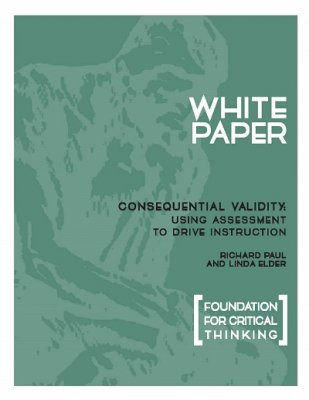 The purpose of assessment in instruction is improvement. The purpose of assessing instruction for critical thinking is improving the teaching of discipline-based thinking (historical, biological, sociological, mathematical thinking…). It is to improve students’ abilities to think their way through content, using disciplined skill in reasoning. The more particular we can be about what we want students to learn about critical thinking, the better can we devise instruction to serve that particular purpose.
The purpose of assessment in instruction is improvement. The purpose of assessing instruction for critical thinking is improving the teaching of discipline-based thinking (historical, biological, sociological, mathematical thinking…). It is to improve students’ abilities to think their way through content, using disciplined skill in reasoning. The more particular we can be about what we want students to learn about critical thinking, the better can we devise instruction to serve that particular purpose.
Unfortunately, standardized tests now widely used in critical thinking are not designed to impact instruction. There is a significant disconnect between what standardized tests assess and what we want students to learn. This workshop will focus on the integration of assessment and critical thinking across the curriculum. It will also introduce participants to the critical thinking assessment tools offered by the Foundation for Critical Thinking.
This workshop is designed for faculty and administrators at the high school, community college, college and university levels. Participants will leave the workshop with a higher level of critical thinking testing and assessment literacy, and will therefore be in a better position to choose an institutional approach to the testing of critical thinking that squares well with established educational goals and concerns. Click here for our white paper on testing and assessment
All participants will have complimentary access to the Center for Critical Thinking Community Online during this workshop.
{"id":"4846","title":"Testing and Assessment: How Can We Best Test and Assess Critical Thinking?... Dr. Gerald Nosich","author":"","content":"<p style=\"text-align: center;\"><span style=\"font-size: large;\"><strong><span style=\"font-family: times new roman, times; color: #333399;\">Saturday April 10 2</span></strong><span style=\"color: #333399;\"><strong><span style=\"font-family: times new roman, times;\">:00 p.m. - 8:00 p.m.</span></strong></span></span><span style=\"color: #333399;\"><strong><span style=\"font-size: large; font-family: times new roman, times;\"> EDT</span></strong></span></p>\r\n<p style=\"text-align: center;\"><br /><span style=\"color: #333399;\"><strong><span style=\"font-size: large; font-family: times new roman, times;\"><span style=\"color: #333399;\"><strong><span style=\"font-size: large; font-family: times new roman, times;\"><span style=\"color: #333399;\"><strong><span style=\"font-size: large; font-family: times new roman, times;\"><span style=\"color: #333399;\"><strong><span style=\"font-size: large; font-family: times new roman, times;\"><span style=\"color: #333399;\"><strong><span style=\"font-size: large; font-family: times new roman, times;\">Times Include Short Breaks & 1-Hour Meal Break<br /><br /></span></strong></span></span></strong></span></span></strong></span></span></strong></span></span></strong></span></p>\r\n<p><span style=\"color: #333399;\"><strong></strong></span><span style=\"color: #333399;\"><strong></strong></span><span style=\"font-size: large; font-family: times new roman, times;\"><br /></span><a href=\"https://www.criticalthinking.org/files/White%20PaperAssessmentSept2007.pdf\" target=\"_blank\"><span style=\"font-size: large; font-family: times new roman, times;\"><img style=\"float: left; margin-right: 10px;\" src=\"https://www.criticalthinking.org/data/courses/White_Paper_on_Assessment.jpg\" alt=\"\" width=\"250\" height=\"324\" /></span></a><span style=\"font-size: large; font-family: times new roman, times;\">The purpose of assessment in instruction is improvement. The purpose of assessing instruction for critical thinking is improving the teaching of discipline-based thinking (historical, biological, sociological, mathematical thinking…). It is to improve students’ abilities to think their way through content, using disciplined skill in reasoning. The more particular we can be about what we want students to learn about critical thinking, the better can we devise instruction to serve that particular purpose. </span><br /><br /><span style=\"font-size: large; font-family: times new roman, times;\">Unfortunately, standardized tests now widely used in critical thinking are not designed to impact instruction. There is a significant disconnect between what standardized tests assess and what we want students to learn. This workshop will focus on the integration of assessment and critical thinking across the curriculum. It will also introduce participants to the critical thinking assessment tools offered by the Foundation for Critical Thinking. </span><br /><br /><span style=\"font-size: large; font-family: times new roman, times;\">This workshop is designed for faculty and administrators at the high school, community college, college and university levels. Participants will leave the workshop with a higher level of critical thinking testing and assessment literacy, and will therefore be in a better position to choose an institutional approach to the testing of critical thinking that squares well with established educational goals and concerns.</span><span style=\"font-size: large; font-family: times new roman, times;\"><strong><span style=\"text-decoration: underline;\"> <a href=\"https://www.criticalthinking.org/pages/consequential-validity-using-assessment-to-drive-instruction/790\" target=\"_blank\">Click here</a></span></strong> for our white paper on testing and assessment</span></p>\r\n<p><span style=\"font-size: large; font-family: times new roman, times;\"><span style=\"font-size: large; font-family: times new roman, times;\"><span style=\"font-size: large; font-family: times new roman, times;\">All participants will have complimentary access to the <strong><span style=\"text-decoration: underline;\"><a href=\"https://community.criticalthinking.org/\" target=\"_blank\">Center for Critical Thinking Community Online</a></span></strong> during this workshop.</span></span></span></p>","public_access":"1","public_downloads":"0","sku":"","files":[],"images":[]}
How To Incorporate Close Reading and Substantive Writing into The Classroom on a Daily Basis… Dr. Gerald Nosich
Saturday April 24 2:00 p.m. - 8:00 p.m. EDT
Times Include Short Breaks & 1-Hour Meal Break
Educated persons are skilled at, and routinely engage in, close reading. When reading, they seek to learn from texts. They generate questions as they read, and they seek answers to those questions by reading widely and skillfully. In short, they seek to become better educated through reading. They do this through the process of intellectually interacting with the texts they read, while they are reading. They come to understand what they read by paraphrasing, elaborating, exemplifying, and illustrating it. They make connections as they read. They evaluate as they read. They bring important ideas into their thinking as they read.
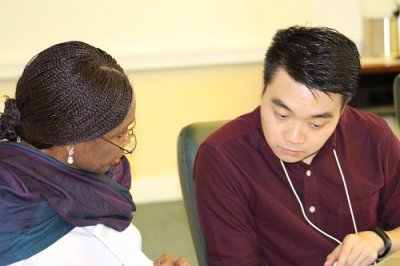 Educated persons skillfully, routinely engage in substantive writing. Substantive writing consists of focusing on a subject worth writing about, and then saying something worth saying about it. It also enhances our reading: whenever we read to acquire knowledge, we should write to take ownership of what we are reading. Furthermore, just as we must write to gain an initial understanding of a subject's primary ideas, so also must we write to begin thinking within the subject as a whole and making connections between ideas within and beyond it.
Educated persons skillfully, routinely engage in substantive writing. Substantive writing consists of focusing on a subject worth writing about, and then saying something worth saying about it. It also enhances our reading: whenever we read to acquire knowledge, we should write to take ownership of what we are reading. Furthermore, just as we must write to gain an initial understanding of a subject's primary ideas, so also must we write to begin thinking within the subject as a whole and making connections between ideas within and beyond it.
Many of our students have never read a text closely or learned to write in a substantive way. Instead, they have developed the habit of skirting by with superficial, impressionistic reading and writing. This workshop will therefore explore basic, foundational processes for developing student skills in these areas. The aim is for these processes to become internalized and used throughout life as powerful tools for continual development.
All participants will have complimentary access to the Center for Critical Thinking Community Online during this workshop.
{"id":"4847","title":"How To Incorporate Close Reading and Substantive Writing into The Classroom on a Daily Basis… Dr. Gerald Nosich","author":"","content":"<p style=\"text-align: center;\"><span style=\"font-size: large; font-family: times new roman, times;\"><span style=\"color: #333399;\"><strong>Saturday April 24 2</strong></span><span style=\"color: #333399;\"><strong>:00 p.m. - 8:00 p.m.</strong></span><span style=\"color: #333399;\"><strong> EDT</strong></span></span></p>\r\n<p style=\"text-align: center;\"><br /><span style=\"font-size: large; font-family: times new roman, times;\"><span style=\"color: #333399;\"><strong><span style=\"color: #333399;\"><strong><span style=\"font-size: large; font-family: times new roman, times;\"><span style=\"color: #333399;\"><strong><span style=\"font-size: large; font-family: times new roman, times;\"><span style=\"color: #333399;\"><strong><span style=\"font-size: large; font-family: times new roman, times;\"><span style=\"color: #333399;\"><strong><span style=\"font-size: large; font-family: times new roman, times;\">Times Include Short Breaks & 1-Hour Meal Break<br /><br /></span></strong></span></span></strong></span></span></strong></span></span></strong></span></strong></span></span></p>\r\n<p><span style=\"font-size: large; color: #000000; font-family: times new roman, times;\"><br />Educated persons are skilled at, and routinely engage in, close reading. When reading, they seek to learn from texts. They generate questions as they read, and they seek answers to those questions by reading widely and skillfully. In short, they seek to become better educated through reading. They do this through the process of intellectually interacting with the texts they read, while they are reading. They come to understand what they read by paraphrasing, elaborating, exemplifying, and illustrating it. They make connections as they read. They evaluate as they read. They bring important ideas into their thinking as they read. </span></p>\r\n<p><span style=\"font-size: large; font-family: times new roman, times;\"><img style=\"float: right; margin-left: 10px; margin-top: 5px; margin-bottom: 5px;\" src=\"https://www.criticalthinking.org/data/courses/two_working___very_good.jpg\" alt=\"\" width=\"325\" height=\"216\" />Educated persons skillfully, routinely engage in substantive writing. Substantive writing consists of focusing on a subject worth writing about, and then saying something worth saying about it. It also enhances our reading: whenever we read to acquire knowledge, we should write to take ownership of what we are reading. Furthermore, just as we must write to gain an initial understanding of a subject's primary ideas, so also must we write to begin thinking within the subject as a whole and making connections between ideas within and beyond it.</span><br /><br /><span style=\"font-size: large; color: #000000; font-family: times new roman, times;\">Many of our students have never read a text closely or learned to write in a substantive way. Instead, they have developed the habit of skirting by with superficial, impressionistic reading and writing. This workshop will therefore explore basic, foundational processes for developing student skills in these areas. The aim is for these processes to become internalized and used throughout life as powerful tools for continual development.</span><span style=\"font-size: large; color: #000000; font-family: times new roman, times;\"></span></p>\r\n<p><span style=\"font-size: large; color: #000000; font-family: times new roman, times;\"><span style=\"font-size: large; font-family: times new roman, times;\"><span style=\"font-size: large; font-family: times new roman, times;\">All participants will have complimentary access to the <strong><span style=\"text-decoration: underline;\"><a href=\"https://community.criticalthinking.org/\" target=\"_blank\">Center for Critical Thinking Community Online</a></span></strong> during this workshop.</span></span></span></p>","public_access":"1","public_downloads":"0","sku":"","files":[],"images":[]}
K-12 Education
Teaching Students How to Study and Learn in Elementary Education… Ms. Carmen Polka
Saturday March 6 2:00 p.m. - 8:00 p.m. EST
Times Include Short Breaks & 1-Hour Meal Break
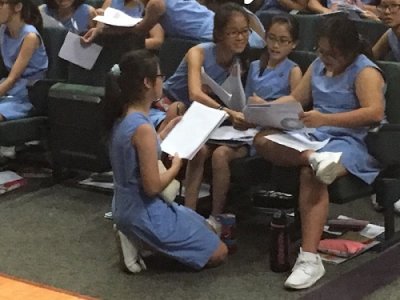 Bringing critical thinking into the classroom entails understanding the concepts and principles embedded in critical thinking, then applying these concepts throughout the curriculum. It means developing powerful strategies that emerge when we take critical thinking seriously as a means for cultivating the intellects of our students at all levels.
Bringing critical thinking into the classroom entails understanding the concepts and principles embedded in critical thinking, then applying these concepts throughout the curriculum. It means developing powerful strategies that emerge when we take critical thinking seriously as a means for cultivating the intellects of our students at all levels.
In this session, we will focus on strategies for engaging the minds of all students throughout the elementary educational experience using common critical thinking language. These strategies are powerful and useful, because each is a way to routinely engage students in thinking about what they are trying to learn as they are learning. Each one approaches students as thinkers who need to learn to reason their way through ideas using their best thinking if they are to realize their capacities as developing persons. These strategies offer students methods for appropriately analyzing and assessing the ideas they are exposed to in the schooling process, and suggest ways of teaching students how to do the (often) hard work of learning. Each critical thinking process represents a shift of responsibility for learning from teacher to student, which is necessary if students are to take command of their minds.
All participants will have complimentary access to the Center for Critical Thinking Community Online during this workshop.
{"id":"4848","title":"Teaching Students How to Study and Learn in Elementary Education… Ms. Carmen Polka","author":"","content":"<p style=\"text-align: center;\"><span style=\"font-size: large;\"><span style=\"color: #333399;\"><strong><span style=\"font-family: times new roman, times;\">Saturday March 6 2</span></strong></span><span style=\"color: #333399;\"><strong><span style=\"font-family: times new roman, times;\">:00 p.m. - 8:00 p.m.</span></strong></span><span style=\"color: #333399;\"><strong><span style=\"font-family: times new roman, times;\"> EST</span></strong></span></span></p>\r\n<p style=\"text-align: center;\"><br /><span style=\"font-size: large;\"><span style=\"color: #333399;\"><strong><span style=\"font-family: times new roman, times;\"><span style=\"color: #333399;\"><strong><span style=\"font-size: large; font-family: times new roman, times;\"><span style=\"color: #333399;\"><strong><span style=\"font-size: large; font-family: times new roman, times;\"><span style=\"color: #333399;\"><strong><span style=\"font-size: large; font-family: times new roman, times;\"><span style=\"color: #333399;\"><strong><span style=\"font-size: large; font-family: times new roman, times;\">Times Include Short Breaks & 1-Hour Meal Break<br /><br /></span></strong></span></span></strong></span></span></strong></span></span></strong></span></span></strong></span></span></p>\r\n<p><span style=\"font-size: large; font-family: times new roman, times;\"><br /><img style=\"float: left; margin-right: 10px; margin-top: 5px; margin-bottom: 5px;\" src=\"https://www.criticalthinking.org/data/courses/Singapore_class_good.jpg\" alt=\"\" width=\"300\" height=\"225\" />Bringing critical thinking into the classroom entails understanding the concepts and principles embedded in critical thinking, then applying these concepts throughout the curriculum. It means developing powerful strategies that emerge when we take critical thinking seriously as a means for cultivating the intellects of our students at all levels. </span><br /><br /><span style=\"font-size: large; font-family: times new roman, times;\">In this session, we will focus on strategies for engaging the minds of all students throughout the elementary educational experience using common critical thinking language. These strategies are powerful and useful, because each is a way to routinely engage students in thinking about what they are trying to learn as they are learning. Each one approaches students as thinkers who need to learn to reason their way through ideas using their best thinking if they are to realize their capacities as developing persons. These strategies offer students methods for appropriately analyzing and assessing the ideas they are exposed to in the schooling process, and suggest ways of teaching students how to do the (often) hard work of learning. Each critical thinking process represents a shift of responsibility for learning from teacher to student, which is necessary if students are to take command of their minds.</span></p>\r\n<p><span style=\"font-size: large; font-family: times new roman, times;\"><span style=\"font-size: large; font-family: times new roman, times;\"><span style=\"font-size: large; font-family: times new roman, times;\">All participants will have complimentary access to the <strong><span style=\"text-decoration: underline;\"><a href=\"https://community.criticalthinking.org/\" target=\"_blank\">Center for Critical Thinking Community Online</a></span></strong> during this workshop.</span></span></span></p>","public_access":"1","public_downloads":"0","sku":"","files":[],"images":[]}
Practical Strategies for Teaching Students How to Study and Learn Using the Foundations of Critical Thinking - Part One: Middle & High School… Dr. Paul Bankes
Saturday & Sunday March 27-28 6:00 p.m. - 9:00 p.m. EDT
Times Include Short Breaks
This session is designed for teachers and administrators concerned with helping students learn to use tools of critical thinking in studying and learning on a typical classroom day. It will focus on the essence of what it means to study academic subjects with discipline. It does not aim to take the intellectual work out of learning, which would be an insult to the intelligence of our students. It will contribute, rather, toward making intellectual work and deep learning more manageable, practical, and intuitive. Our goal is to foster lifelong learning and the traditional ideal of a liberally-educated mind: a mind that questions, probes, and masters varietal forms of knowledge through command of itself, intellectual perseverance, and the tools of learning.
 In this workshop, we will emphasize those foundational intellectual structures and standards of reasonability worth learning explicitly and in themselves, since they help us more deeply interconnect and understand everything we learn. We will also emphasize foundational intellectual dispositions and values that define the disciplined thinker in all fields: intellectual autonomy, intellectual humility, intellectual integrity, intellectual perseverance, intellectual empathy, confidence in reason, and fairmindedness.
In this workshop, we will emphasize those foundational intellectual structures and standards of reasonability worth learning explicitly and in themselves, since they help us more deeply interconnect and understand everything we learn. We will also emphasize foundational intellectual dispositions and values that define the disciplined thinker in all fields: intellectual autonomy, intellectual humility, intellectual integrity, intellectual perseverance, intellectual empathy, confidence in reason, and fairmindedness.
What is worth learning is worth learning well, and there is nothing better worth learning than the very process of learning itself - the development, through systematic intellectual work of the arts, habits, and strategies of a DISCIPLINED mind. In this workshop, we will come to know better how we can reach students with these essential understandings, which are implied by a rich approach to critical thinking in teaching and learning at all levels and in all classes.
This workshop focuses specifically on the how to bring the analysis and assessment of thinking into teaching and learning, while part two focuses on the cultivation of intellectual virtues and understanding of the barriers to critical thinking.
All participants will have complimentary access to the Center for Critical Thinking Community Online during this workshop.
{"id":"4849","title":"Practical Strategies for Teaching Students How to Study and Learn Using the Foundations of Critical Thinking - Part One: Middle & High School… Dr. Paul Bankes","author":"","content":"<p style=\"text-align: center;\"><span style=\"font-size: large;\"><span style=\"color: #333399;\"><strong><span style=\"font-family: times new roman, times;\">Saturday & Sunday March 27-28 </span></strong></span><span style=\"color: #333399;\"><strong><span style=\"font-family: times new roman, times;\">6:00 p.m. - 9:00 p.m. EDT</span></strong></span></span></p>\r\n<p style=\"text-align: center;\"><br /><span style=\"font-size: large;\"><span style=\"color: #333399;\"><strong><span style=\"font-family: times new roman, times;\"><span style=\"color: #333399;\"><strong><span style=\"font-size: large; font-family: times new roman, times;\"><span style=\"color: #333399;\"><strong><span style=\"font-size: large; font-family: times new roman, times;\"><span style=\"color: #333399;\"><strong><span style=\"font-size: large; font-family: times new roman, times;\"><span style=\"color: #333399;\"><strong><span style=\"font-size: large; font-family: times new roman, times;\">Times Include Short Breaks<br /><br /></span></strong></span></span></strong></span></span></strong></span></span></strong></span></span></strong></span></span></p>\r\n<p><span style=\"font-size: large; font-family: times new roman, times;\"><br />This session is designed for teachers and administrators concerned with helping students learn to use tools of critical thinking in studying and learning on a typical classroom day. It will focus on the essence of what it means to study academic subjects with discipline. It does not aim to take the intellectual work out of learning, which would be an insult to the intelligence of our students. It will contribute, rather, toward making intellectual work and deep learning more manageable, practical, and intuitive. Our goal is to foster lifelong learning and the traditional ideal of a liberally-educated mind: a mind that questions, probes, and masters varietal forms of knowledge through command of itself, intellectual perseverance, and the tools of learning. </span><br /><br /><span style=\"font-size: large; font-family: times new roman, times;\"><img style=\"float: right; margin-left: 10px; margin-top: 5px; margin-bottom: 5px;\" src=\"https://www.criticalthinking.org/data/courses/man_looking_at_ipad_pro_2698465_1.jpg\" alt=\"\" width=\"240\" height=\"321\" /></span><span style=\"font-size: large; font-family: times new roman, times;\">In this workshop, we will emphasize those foundational intellectual structures and standards of reasonability worth learning explicitly and in themselves, since they help us more deeply interconnect and understand everything we learn. We will also emphasize foundational intellectual dispositions and values that define the disciplined thinker in all fields: intellectual autonomy, intellectual humility, intellectual integrity, intellectual perseverance, intellectual empathy, confidence in reason, and fairmindedness. </span><br /><br /><span style=\"font-size: large; font-family: times new roman, times;\">What is worth learning is worth learning well, and there is nothing better worth learning than the very process of learning itself - the development, through systematic intellectual work of the arts, habits, and strategies of a DISCIPLINED mind. In this workshop, we will come to know better how we can reach students with these essential understandings, which are implied by a rich approach to critical thinking in teaching and learning at all levels and in all classes.</span><br /><br /><span style=\"font-size: large; font-family: times new roman, times;\">This workshop focuses specifically on the how to bring the analysis and assessment of thinking into teaching and learning, while part two focuses on the cultivation of intellectual virtues and understanding of the barriers to critical thinking.</span><span style=\"font-size: large; font-family: times new roman, times;\"></span></p>\r\n<p><span style=\"font-size: large; font-family: times new roman, times;\"><span style=\"font-size: large; font-family: times new roman, times;\"><span style=\"font-size: large; font-family: times new roman, times;\">All participants will have complimentary access to the <strong><span style=\"text-decoration: underline;\"><a href=\"https://community.criticalthinking.org/\" target=\"_blank\">Center for Critical Thinking Community Online</a></span></strong> during this workshop.</span></span></span></p>","public_access":"1","public_downloads":"0","sku":"","files":[],"images":[]}
Practical Strategies for Teaching Students How to Study and Learn Using the Foundations of Critical Thinking - Part Two: Middle & High School… Dr. Paul Bankes
Saturday & Sunday April 17 -18 6:00 p.m. - 9:00 p.m. EDT
Times Include Short Breaks
This session is designed for teachers and administrators concerned with helping students learn to use tools of critical thinking in studying and learning on a typical classroom day. In this session we focus on two primary conceptual areas of critical thinking – the importance of cultivating intellectual virtues as well as understanding barriers to critical thinking.
 It is possible to develop as a thinker, and yet not to develop as a fairminded thinker. It is possible to learn to use one’s mental skills in a narrow, self-serving way, and many highly skilled thinkers do just that. But the best thinkers do not pursue selfish goals. They do not seek to manipulate others. They strive to be fairminded, even when it means they have to give something up in the process. They recognize that the mind is not always fair. And they recognize that to be fairminded, they also must develop specific traits of mind – traits such as intellectual humility, intellectual integrity, intellectual courage, intellectual autonomy, intellectual empathy, intellectual perseverance, and confidence in reason.
It is possible to develop as a thinker, and yet not to develop as a fairminded thinker. It is possible to learn to use one’s mental skills in a narrow, self-serving way, and many highly skilled thinkers do just that. But the best thinkers do not pursue selfish goals. They do not seek to manipulate others. They strive to be fairminded, even when it means they have to give something up in the process. They recognize that the mind is not always fair. And they recognize that to be fairminded, they also must develop specific traits of mind – traits such as intellectual humility, intellectual integrity, intellectual courage, intellectual autonomy, intellectual empathy, intellectual perseverance, and confidence in reason.
In this session, we introduce what “fairminded” means, and we discuss the mental characteristics that accompany fairmindedness. If students are to develop as a fairminded thinkers, they will have to practice being fairminded. They will have to catch themselves in acts of selfishness and begin to correct their behavior. They will have to become committed to living a rational, compassionate, contributory life, to look outside themselves and see how your behavior affects other people. They will have to decide, again and again, that being fairminded is crucial to their identity as a person.
This workshop will help you foster in students the desire to become persons of character, by increasingly embodying intellectual virtues over time. We will focus on how to teach, for instance, intellectual empathy, through a series of activities that can be used routinely in teaching. We will also focus on egocentric and sociocentric thinking as barriers to fairminded critical thinking, with activities for students.
All participants will have complimentary access to the Center for Critical Thinking Community Online during this workshop.
{"id":"4850","title":"Practical Strategies for Teaching Students How to Study and Learn Using the Foundations of Critical Thinking - Part Two: Middle & High School… Dr. Paul Bankes","author":"","content":"<p style=\"text-align: center;\"><span style=\"font-size: large;\"><span style=\"color: #333399;\"><strong><span style=\"font-family: times new roman, times;\">Saturday & Sunday April 17 -18 </span></strong></span><span style=\"color: #333399;\"><strong><span style=\"font-family: times new roman, times;\">6:00 p.m. - 9:00 p.m. EDT</span></strong></span></span></p>\r\n<p style=\"text-align: center;\"><br /><span style=\"font-size: large;\"><span style=\"color: #333399;\"><strong><span style=\"font-family: times new roman, times;\"><span style=\"color: #333399;\"><strong><span style=\"font-size: large; font-family: times new roman, times;\"><span style=\"color: #333399;\"><strong><span style=\"font-size: large; font-family: times new roman, times;\"><span style=\"color: #333399;\"><strong><span style=\"font-size: large; font-family: times new roman, times;\"><span style=\"color: #333399;\"><strong><span style=\"font-size: large; font-family: times new roman, times;\">Times Include Short Breaks<br /><br /></span></strong></span></span></strong></span></span></strong></span></span></strong></span></span></strong></span></span></p>\r\n<p><span style=\"font-size: large; font-family: times new roman, times; color: #000000;\"><br />This session is designed for teachers and administrators concerned with helping students learn to use tools of critical thinking in studying and learning on a typical classroom day. In this session we focus on two primary conceptual areas of critical thinking – the importance of cultivating intellectual virtues as well as understanding barriers to critical thinking.</span></p>\r\n<p><span style=\"font-size: large; font-family: times new roman, times; color: #000000;\"><img style=\"float: left; margin-right: 10px; margin-top: 5px; margin-bottom: 5px;\" src=\"https://www.criticalthinking.org/data/courses/Student_on_PC.jpg\" alt=\"\" width=\"225\" height=\"338\" />It is possible to develop as a thinker, and yet not to develop as a fairminded thinker. It is possible to learn to use one’s mental skills in a narrow, self-serving way, and many highly skilled thinkers do just that. But the best thinkers do not pursue selfish goals. They do not seek to manipulate others. They strive to be fairminded, even when it means they have to give something up in the process. They recognize that the mind is not always fair. And they recognize that to be fairminded, they also must develop specific traits of mind – traits such as intellectual humility, intellectual integrity, intellectual courage, intellectual autonomy, intellectual empathy, intellectual perseverance, and confidence in reason. </span></p>\r\n<p><span style=\"font-size: large; font-family: times new roman, times; color: #000000;\">In this session, we introduce what “fairminded” means, and we discuss the mental characteristics that accompany fairmindedness. If students are to develop as a fairminded thinkers, they will have to practice being fairminded. They will have to catch themselves in acts of selfishness and begin to correct their behavior. They will have to become committed to living a rational, compassionate, contributory life, to look outside themselves and see how your behavior affects other people. They will have to decide, again and again, that being fairminded is crucial to their identity as a person. </span></p>\r\n<p><span style=\"font-size: large; font-family: times new roman, times; color: #000000;\">This workshop will help you foster in students the desire to become persons of character, by increasingly embodying intellectual virtues over time. We will focus on how to teach, for instance, intellectual empathy, through a series of activities that can be used routinely in teaching. We will also focus on egocentric and sociocentric thinking as barriers to fairminded critical thinking, with activities for students.</span><span style=\"font-size: large; font-family: times new roman, times; color: #000000;\"></span></p>\r\n<p><span style=\"font-size: large; font-family: times new roman, times; color: #000000;\"><span style=\"font-size: large; font-family: times new roman, times;\"><span style=\"font-size: large; font-family: times new roman, times;\">All participants will have complimentary access to the <strong><span style=\"text-decoration: underline;\"><a href=\"https://community.criticalthinking.org/\" target=\"_blank\">Center for Critical Thinking Community Online</a></span></strong> during this workshop.</span></span></span></p>","public_access":"1","public_downloads":"0","sku":"","files":[],"images":[]}
Specialty Topic
Fostering Emotional Intelligence and Helping Students Overcome Bad Habits of Thought… Dr. Linda Elder
Saturday & Sunday March 20-21 6:00 p.m. - 9:00 p.m. EDT
Times Include Short Breaks
Critical thinking provides the crucial link between intelligence and emotions in the ‘emotionally intelligent’ person. It is the only plausible vehicle by means of which we can bring intelligence to bear upon our emotional lives, and enables us to take active command of not only our thoughts, but our emotions and desires as well. Hence, neither teaching nor learning can afford to disregard the emotional dimension of the mind.
 If we are concerned with developing our rationality in order to improve our lives, we must understand the powerful role that both emotions and thoughts play in our minds. We must understand the ways in which affect and cognition influence one another in determining both our outlook on life and our behavior. Most importantly, we must come to terms with those truths about the human mind that enable us to begin the process of taking charge of our minds: that thoughts and emotions are inextricably bound, that we have both irrational and rational tendencies, that our inner conflicts are never best understood as a simple matter between emotion and reason, that self-command of mind requires both extended education and self-discipline, that our fullest rational development is dependent on the development of rational affect, and that to bring intelligence to bear upon emotions, we must take charge of the thinking underlying those emotions. And our students must do the same. It is irrational thinking that causes bad habits of thought that impede learning. This session focuses on the barriers to critical thinking that impede emotional intelligence and our students’ abilities to overcome destructive habits of thought.
If we are concerned with developing our rationality in order to improve our lives, we must understand the powerful role that both emotions and thoughts play in our minds. We must understand the ways in which affect and cognition influence one another in determining both our outlook on life and our behavior. Most importantly, we must come to terms with those truths about the human mind that enable us to begin the process of taking charge of our minds: that thoughts and emotions are inextricably bound, that we have both irrational and rational tendencies, that our inner conflicts are never best understood as a simple matter between emotion and reason, that self-command of mind requires both extended education and self-discipline, that our fullest rational development is dependent on the development of rational affect, and that to bring intelligence to bear upon emotions, we must take charge of the thinking underlying those emotions. And our students must do the same. It is irrational thinking that causes bad habits of thought that impede learning. This session focuses on the barriers to critical thinking that impede emotional intelligence and our students’ abilities to overcome destructive habits of thought.
All participants will have complimentary access to the Center for Critical Thinking Community Online during this workshop.
{"id":"4852","title":"Fostering Emotional Intelligence and Helping Students Overcome Bad Habits of Thought… Dr. Linda Elder","author":"","content":"<p style=\"text-align: center;\"><span style=\"color: #333399; font-size: large;\"><strong><span style=\"font-family: times new roman, times;\">Saturday & Sunday March 20-21 </span></strong></span><span style=\"color: #333399;\"><strong><span style=\"font-size: large; font-family: times new roman, times;\">6:00 p.m. - 9:00 p.m. EDT</span></strong></span></p>\r\n<p style=\"text-align: center;\"><br /><span style=\"color: #333399;\"><strong><span style=\"font-size: large; font-family: times new roman, times;\"><span style=\"color: #333399;\"><strong><span style=\"font-size: large; font-family: times new roman, times;\"><span style=\"color: #333399;\"><strong><span style=\"font-size: large; font-family: times new roman, times;\"><span style=\"color: #333399;\"><strong><span style=\"font-size: large; font-family: times new roman, times;\"><span style=\"color: #333399;\"><strong><span style=\"font-size: large; font-family: times new roman, times;\">Times Include Short Breaks<br /><br /></span></strong></span></span></strong></span></span></strong></span></span></strong></span></span></strong></span></p>\r\n<p><span style=\"font-size: large; font-family: times new roman, times;\"><br />Critical thinking provides the crucial link between intelligence and emotions in the ‘emotionally intelligent’ person. It is the only plausible vehicle by means of which we can bring intelligence to bear upon our emotional lives, and enables us to take active command of not only our thoughts, but our emotions and desires as well. Hence, neither teaching nor learning can afford to disregard the emotional dimension of the mind.</span></p>\r\n<p><span style=\"font-size: large; font-family: times new roman, times;\"><img style=\"float: right; margin-left: 10px; margin-top: 5px; margin-bottom: 5px;\" src=\"https://www.criticalthinking.org/data/courses/Man_smiling_tablet_1.jpg\" alt=\"\" width=\"345\" height=\"229\" />If we are concerned with developing our rationality in order to improve our lives, we must understand the powerful role that both emotions and thoughts play in our minds. We must understand the ways in which affect and cognition influence one another in determining both our outlook on life and our behavior. Most importantly, we must come to terms with those truths about the human mind that enable us to begin the process of taking charge of our minds: that thoughts and emotions are inextricably bound, that we have both irrational and rational tendencies, that our inner conflicts are never best understood as a simple matter between emotion and reason, that self-command of mind requires both extended education and self-discipline, that our fullest rational development is dependent on the development of rational affect, and that to bring intelligence to bear upon emotions, we must take charge of the thinking underlying those emotions. And our students must do the same. It is irrational thinking that causes bad habits of thought that impede learning. This session focuses on the barriers to critical thinking that impede emotional intelligence and our students’ abilities to overcome destructive habits of thought. </span></p>\r\n<p><span style=\"font-size: large; font-family: times new roman, times;\"><span style=\"font-size: large; font-family: times new roman, times;\">All participants will have complimentary access to the <strong><span style=\"text-decoration: underline;\"><a href=\"https://community.criticalthinking.org/\" target=\"_blank\">Center for Critical Thinking Community Online</a></span></strong> during this workshop.</span></span></p>","public_access":"1","public_downloads":"0","sku":"","files":[],"images":[]}
Business, Government, Military, and Law Enforcement
Understanding Robust Critical Thinking as Essential to Skilled Decision-Making and Problem-Solving in Business and Government... Dr. Brian Barnes
Friday February 26 2:00 p.m. - 8:00 p.m. EST
Times Include Short Breaks & 1-Hour Meal Break
There are multiple dimensions of effective problem-solving and decision-making. For instance, by using one powerful set of critical thinking tools – the elements of reasoning – as our guide, we can identify at least nine dimensions that represent potential problems and opportunities for thought. These dimensions do not define a procedure that can be followed mindlessly or mechanically; rather, they presuppose good judgment and sound thinking in every dimension.
To be an effective and rational decision-maker: 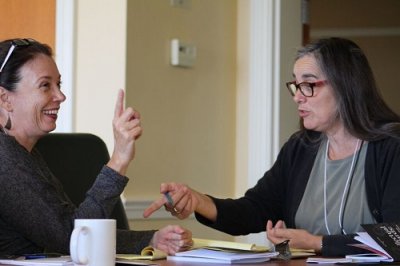
- Figure out, and regularly articulate, your most fundamental goals, purposes, and needs. Your decisions should help you remove obstacles and create opportunities to reach your goals, achieve your purposes, and satisfy your needs.
- Whenever possible, take problems and decisions one by one. State the situation and formulate the alternatives as clearly and precisely as you can.
- Study the circumstances surrounding the alternative possible decisions to make clear the kind of decision you are dealing with. Figure out what implications follow from the various possible alternatives before you. Differentiate decisions over which you have some control from decisions that seem forced on you. Concentrate your efforts on the most important decisions and those on which you can have the most impact.
- Figure out what information you need, and actively seek that information.
- Carefully analyze and interpret the information you collect, drawing what reasonable inferences you can.
- Figure out your options for action. What can you do in the short term? In the long term? Recognize explicitly your limitations in money, time, power, etc.
- Evaluate your options in the situation, taking into account their advantages and disadvantages.
- Adopt a strategic approach to the decision, and follow through on that strategy. This may involve direct action or a wait-and-see strategy that is carefully thought through.
- When you act, monitor the implications of your actions as they begin to emerge. Be ready to revise your strategy at a moment's notice if the situation requires. Be prepared to shift your strategy, your analysis, your statement of the kind of decision, or all three as more information becomes available to you.
In this session, we will explore these abilities and how they can best be employed for effective problem-solving and decision-making in business, government, and all areas of administration.
All participants will have complimentary access to the Center for Critical Thinking Community Online during this workshop.
{"id":"4855","title":"Understanding Robust Critical Thinking as Essential to Skilled Decision-Making and Problem-Solving in Business and Government... Dr. Brian Barnes","author":"","content":"<p style=\"text-align: center;\"><span style=\"font-size: large;\"><span style=\"color: #333399;\"><strong><span style=\"font-family: times new roman, times;\">Friday February 26 2</span></strong></span><span style=\"color: #333399;\"><strong><span style=\"font-family: times new roman, times;\">:00 p.m. - 8:00 p.m.</span></strong></span><span style=\"color: #333399;\"><strong><span style=\"font-family: times new roman, times;\"> EST</span></strong></span></span></p>\r\n<p style=\"text-align: center;\"><br /><span style=\"font-size: large;\"><span style=\"color: #333399;\"><strong><span style=\"font-family: times new roman, times;\"><span style=\"color: #333399;\"><strong><span style=\"font-size: large; font-family: times new roman, times;\"><span style=\"color: #333399;\"><strong><span style=\"font-size: large; font-family: times new roman, times;\"><span style=\"color: #333399;\"><strong><span style=\"font-size: large; font-family: times new roman, times;\"><span style=\"color: #333399;\"><strong><span style=\"font-size: large; font-family: times new roman, times;\">Times Include Short Breaks & 1-Hour Meal Break<br /><br /></span></strong></span></span></strong></span></span></strong></span></span></strong></span></span></strong></span></span></p>\r\n<p><span style=\"font-size: large; font-family: times new roman, times;\"><br />There are multiple dimensions of effective problem-solving and decision-making. For instance, by using one powerful set of critical thinking tools – the elements of reasoning – as our guide, we can identify at least nine dimensions that represent potential problems and opportunities for thought. These dimensions do not define a procedure that can be followed mindlessly or mechanically; rather, they presuppose good judgment and sound thinking in every dimension.</span><br /><br /><span style=\"font-size: large; font-family: times new roman, times;\">To be an effective and rational decision-maker: </span><span style=\"font-size: large; font-family: times new roman, times;\"><img style=\"margin-left: 10px; margin-top: 5px; margin-bottom: 5px; float: right;\" src=\"https://www.criticalthinking.org/data/courses/women_talking_very_good.jpg\" alt=\"\" width=\"300\" height=\"200\" /></span></p>\r\n<ul>\r\n<li><span style=\"font-size: large; font-family: times new roman, times;\">Figure out, and regularly articulate, your most fundamental goals, purposes, and needs. Your decisions should help you remove obstacles and create opportunities to reach your goals, achieve your purposes, and satisfy your needs. </span></li>\r\n<li><span style=\"font-size: large; font-family: times new roman, times;\">Whenever possible, take problems and decisions one by one. State the situation and formulate the alternatives as clearly and precisely as you can. </span></li>\r\n<li><span style=\"font-size: large; font-family: times new roman, times;\">Study the circumstances surrounding the alternative possible decisions to make clear the kind of decision you are dealing with. Figure out what implications follow from the various possible alternatives before you. Differentiate decisions over which you have some control from decisions that seem forced on you. Concentrate your efforts on the most important decisions and those on which you can have the most impact. </span></li>\r\n<li><span style=\"font-size: large; font-family: times new roman, times;\">Figure out what information you need, and actively seek that information. </span></li>\r\n<li><span style=\"font-size: large; font-family: times new roman, times;\">Carefully analyze and interpret the information you collect, drawing what reasonable inferences you can. </span></li>\r\n<li><span style=\"font-size: large; font-family: times new roman, times;\">Figure out your options for action. What can you do in the short term? In the long term? Recognize explicitly your limitations in money, time, power, etc. </span></li>\r\n<li><span style=\"font-size: large; font-family: times new roman, times;\">Evaluate your options in the situation, taking into account their advantages and disadvantages. </span></li>\r\n<li><span style=\"font-size: large; font-family: times new roman, times;\">Adopt a strategic approach to the decision, and follow through on that strategy. This may involve direct action or a wait-and-see strategy that is carefully thought through. </span></li>\r\n<li><span style=\"font-size: large; font-family: times new roman, times;\">When you act, monitor the implications of your actions as they begin to emerge. Be ready to revise your strategy at a moment's notice if the situation requires. Be prepared to shift your strategy, your analysis, your statement of the kind of decision, or all three as more information becomes available to you. </span></li>\r\n</ul>\r\n<p><br /><span style=\"font-size: large; font-family: times new roman, times;\">In this session, we will explore these abilities and how they can best be employed for effective problem-solving and decision-making in business, government, and all areas of administration.</span></p>\r\n<p><span style=\"font-size: large; font-family: times new roman, times;\"><span style=\"font-size: large; font-family: times new roman, times;\">All participants will have complimentary access to the <strong><span style=\"text-decoration: underline;\"><a href=\"https://community.criticalthinking.org/\" target=\"_blank\">Center for Critical Thinking Community Online</a></span></strong> during this workshop.</span></span></p>","public_access":"1","public_downloads":"0","sku":"","files":[],"images":[]}
How to Effectively Use the Paul-Elder Framework for Critical Thinking throughout Military Intelligence and Education… Dr. Brian Barnes
Saturday April 3 2:00 p.m. - 8:00 p.m. EDT
Times Include Short Breaks & 1-Hour Meal Break
For many years, the military arena has embraced the work of The Foundation for Critical Thinking. Because of the robust and integrated nature of our work , our framework remains the only explicit approach to critical thinking instruction detailed for use in an Army Techniques Publication (ATP 2-33.4 - Intelligence Analysis ). The Paul-Elder Framework for Critical Thinking is used throughout military programs in all branches and within the intelligence community at  many levels. Our approach has been implemented at the U.S. Naval War College, at Georgia Military College, at Fort Leavenworth’s U.S. Army Command and General Staff College, and at many other government and military institutions. Th e Foundation for Critical Thinking continues to play a vital role in developing informed, efficient military leaders and personnel who communicate effectively and want to advance substantive critical thinking through their work in the U.S. Military .
many levels. Our approach has been implemented at the U.S. Naval War College, at Georgia Military College, at Fort Leavenworth’s U.S. Army Command and General Staff College, and at many other government and military institutions. Th e Foundation for Critical Thinking continues to play a vital role in developing informed, efficient military leaders and personnel who communicate effectively and want to advance substantive critical thinking through their work in the U.S. Military .
The purpose of this seminar and course is to cultivate higher understandings of critical thinking concepts and principles within your departments, institutions, branches, and throughout all education programs in the military and the intelligence community. Through this seminar and course, you will learn to better employ critical thinking in reasoning through issues and problems every day. You will learn processes for better promoting substantive critical thinking, and for improving decision-making abilities within your education and training courses.
Through this seminar, you will be better able to help students:
- better use critical thinking as a set of tools for effectively thinking through the questions, issues, and challenges they face in all parts of their work;
- learn the art of intelligent, strategic decision-making through use of critical thinking concepts;
comprehend the long-term implications and benefits of building a critical thinking culture; - internalize the skills, abilities, and traits of reasonable, logical persons who think critically through all manners of questions and problems; and
- understand and more effectively deal with the barriers to cultivating critical thinking within military and intelligence programs.
All participants will have complimentary access to the Center for Critical Thinking Community Online during this workshop.
{"id":"4856","title":"How to Effectively Use the Paul-Elder Framework for Critical Thinking throughout Military Intelligence and Education… Dr. Brian Barnes ","author":"","content":"<p style=\"text-align: center;\"><span style=\"font-size: large;\"><span style=\"color: #333399;\"><strong><span style=\"font-family: times new roman, times;\">Saturday April 3 2</span></strong></span><span style=\"color: #333399;\"><strong><span style=\"font-family: times new roman, times;\">:00 p.m. - 8:00 p.m.</span></strong></span><span style=\"color: #333399;\"><strong><span style=\"font-family: times new roman, times;\"> EDT</span></strong></span></span></p>\r\n<p style=\"text-align: center;\"><br /><span style=\"font-size: large;\"><span style=\"color: #333399;\"><strong><span style=\"font-family: times new roman, times;\"><span style=\"color: #333399;\"><strong><span style=\"font-size: large; font-family: times new roman, times;\"><span style=\"color: #333399;\"><strong><span style=\"font-size: large; font-family: times new roman, times;\"><span style=\"color: #333399;\"><strong><span style=\"font-size: large; font-family: times new roman, times;\"><span style=\"color: #333399;\"><strong><span style=\"font-size: large; font-family: times new roman, times;\">Times Include Short Breaks & 1-Hour Meal Break<br /><br /></span></strong></span></span></strong></span></span></strong></span></span></strong></span></span></strong></span></span></p>\r\n<p><span style=\"font-size: large; font-family: times new roman, times;\"><br />For many years, the military arena has embraced the work of The Foundation for Critical Thinking. Because of the robust and integrated nature of our work , our framework remains the only explicit approach to critical thinking instruction detailed for use in an Army Techniques Publication (ATP 2-33.4 - Intelligence Analysis ). The Paul-Elder Framework for Critical Thinking is used throughout military programs in all branches and within the intelligence community at </span><span style=\"font-size: large; font-family: times new roman, times;\"><img style=\"float: left; margin-right: 10px; margin-top: 5px; margin-bottom: 5px;\" src=\"https://www.criticalthinking.org/data/courses/Globe.png\" alt=\"\" width=\"280\" height=\"280\" /></span><span style=\"font-size: large; font-family: times new roman, times;\">many levels. Our approach has been implemented at the U.S. Naval War College, at Georgia Military College, at Fort Leavenworth’s U.S. </span><span style=\"font-size: large; font-family: times new roman, times;\">Army Command and General Staff College, and at many other government and military institutions. Th e Foundation for </span><span style=\"font-size: large; font-family: times new roman, times;\">Critical Thinking continues to play a vital role in developing informed, efficient military leaders and personnel who communicate effectively and want to advance substantive critical thinking through their work in the U.S. Military . </span></p>\r\n<p><span style=\"font-size: large; font-family: times new roman, times;\">The purpose of this seminar and course is to cultivate higher understandings of critical thinking concepts and principles within your departments, institutions, branches, and throughout all education programs in the military and the intelligence community. Through this seminar and course, you will learn to better employ critical thinking in reasoning through issues and problems every day. You will learn processes for better promoting substantive critical thinking, and for improving decision-making abilities within your education and training courses. </span></p>\r\n<p><span style=\"font-size: large; font-family: times new roman, times;\">Through this seminar, you will be better able to help students: </span></p>\r\n<ul>\r\n<li><span style=\"font-size: large; font-family: times new roman, times;\">better use critical thinking as a set of tools for effectively thinking through the questions, issues, and challenges they face in all parts of their work; </span></li>\r\n<li><span style=\"font-size: large; font-family: times new roman, times;\">learn the art of intelligent, strategic decision-making through use of critical thinking concepts; </span><br /><span style=\"font-size: large; font-family: times new roman, times;\">comprehend the long-term implications and benefits of building a critical thinking culture; </span></li>\r\n<li><span style=\"font-size: large; font-family: times new roman, times;\">internalize the skills, abilities, and traits of reasonable, logical persons who think critically through all manners of questions and problems; and </span></li>\r\n<li><span style=\"font-size: large; font-family: times new roman, times;\">understand and more effectively deal with the barriers to cultivating critical thinking within military and intelligence programs. </span></li>\r\n</ul>\r\n<p><span style=\"font-size: large; font-family: times new roman, times;\"><span style=\"font-size: large; font-family: times new roman, times;\">All participants will have complimentary access to the <strong><span style=\"text-decoration: underline;\"><a href=\"https://community.criticalthinking.org/\" target=\"_blank\">Center for Critical Thinking Community Online</a></span></strong> during this workshop.</span></span></p>","public_access":"1","public_downloads":"0","sku":"","files":[],"images":[]}
Law Enforcement and Fairminded Critical Thinking: Are They Compatible?... Dr. Brian Barnes
Friday April 23 2:00 p.m. - 8:00 p.m. EDT
Times Include Short Breaks & 1-Hour Meal Break
It is time to incorporate robust critical thinking into your police department at this revolutionary time in our history, in which a more humane approach to policing will be increasingly required. We are aware of the various discussions focused on de-escalating violent situations involving police interactions. However, revolutionizing how police departments operate is not simple, since changing the way police officers think is not simple. It is only by incorporating mandatory  fairminded critical thinking courses/programs into police training across the board that we can bring about the long-term permanent change needed to deal with the crisis at hand, and to move into a more compassionate and charitable future.
fairminded critical thinking courses/programs into police training across the board that we can bring about the long-term permanent change needed to deal with the crisis at hand, and to move into a more compassionate and charitable future.
Recruits, Officers, and Leaders in this workshop will:
- come to see the importance in thinking within multiple viewpoints to fully understand those viewpoints; to change their thinking when someone else's reasoning is better, and when new information and the situation require it.
- improve their ability to reason fairmindedly through the many complex problems they face as police officers.
- be introduced to the importance of cultivating ethical virtues in their own minds - virtues such as empathy, integrity, honesty, forthrightness, intellectual autonomy, and confidence in reason.
- learn to take their thinking apart so they can routinely identify faulty assumptions and ideas in their thinking that lead to poor judgments.
- learn the criteria by which they should make judgments in all police encounters and situations. This includes objectivity, impartiality, and fairness.
- learn the barriers to critical thinking all police officers face, as do all humans – namely, egocentric and sociocentric thinking.
- learn to think through implications and consequences of their actions before acting.
All participants will have complimentary access to the Center for Critical Thinking Community Online during this workshop.
{"id":"4857","title":"Law Enforcement and Fairminded Critical Thinking: Are They Compatible?... Dr. Brian Barnes ","author":"","content":"<p style=\"text-align: center;\"><span style=\"font-size: large;\"><span style=\"color: #333399;\"><strong><span style=\"font-family: times new roman, times;\">Friday April 23 2</span></strong></span><span style=\"color: #333399;\"><strong><span style=\"font-family: times new roman, times;\">:00 p.m. - 8:00 p.m.</span></strong></span><span style=\"color: #333399;\"><strong><span style=\"font-family: times new roman, times;\"> EDT</span></strong></span></span></p>\r\n<p style=\"text-align: center;\"><br /><span style=\"font-size: large;\"><span style=\"color: #333399;\"><strong><span style=\"font-family: times new roman, times;\"><span style=\"color: #333399;\"><strong><span style=\"font-size: large; font-family: times new roman, times;\"><span style=\"color: #333399;\"><strong><span style=\"font-size: large; font-family: times new roman, times;\"><span style=\"color: #333399;\"><strong><span style=\"font-size: large; font-family: times new roman, times;\"><span style=\"color: #333399;\"><strong><span style=\"font-size: large; font-family: times new roman, times;\">Times Include Short Breaks & 1-Hour Meal Break<br /><br /></span></strong></span></span></strong></span></span></strong></span></span></strong></span></span></strong></span></span></p>\r\n<p><span style=\"font-size: large; font-family: times new roman, times;\"><br />It is time to incorporate robust critical thinking into your police department at this revolutionary time in our history, in which a more humane approach to policing will be increasingly required. We are aware of the various </span><span style=\"font-size: large; font-family: times new roman, times;\">discussions focused on de-escalating violent situations involving police interactions. However, revolutionizing how police </span><span style=\"font-size: large; font-family: times new roman, times;\">departments operate is not </span><span style=\"font-size: large; font-family: times new roman, times;\">simple, since changing the way police officers think is not simple. It is only by incorporating mandatory </span><a href=\"https://www.criticalthinking.org/store/events/register_1.php?id=611\" target=\"_blank\"><span style=\"font-size: large; font-family: times new roman, times;\"><img style=\"float: right; margin-left: 10px; margin-top: 5px; margin-bottom: 5px;\" src=\"https://www.criticalthinking.org/data/courses/Officer_with_Child_2_1.jpg\" alt=\"\" width=\"225\" height=\"336\" /></span></a><span style=\"font-size: large; font-family: times new roman, times;\">fairminded critical thinking courses/programs into police training across the board that we can bring about the long-term permanent change needed to deal with the crisis at hand, and to move into a more compassionate and charitable future.</span><br /><br /><span style=\"font-size: large; font-family: times new roman, times;\">Recruits, Officers, and Leaders in this workshop will:</span></p>\r\n<ul>\r\n<li><span style=\"font-size: large; font-family: times new roman, times;\">come to see the importance in thinking within multiple viewpoints to fully understand those viewpoints; to change their thinking when someone else's reasoning is better, and when new information and the situation require it. </span></li>\r\n<li><span style=\"font-size: large; font-family: times new roman, times;\">improve their ability to reason fairmindedly through the many complex problems they face as police officers. </span></li>\r\n<li><span style=\"font-size: large; font-family: times new roman, times;\">be introduced to the importance of cultivating ethical virtues in their own minds - virtues such as empathy, integrity, honesty, forthrightness, intellectual autonomy, and confidence in reason. </span></li>\r\n<li><span style=\"font-size: large; font-family: times new roman, times;\">learn to take their thinking apart so they can routinely identify faulty assumptions and ideas in their thinking that lead to poor judgments. </span></li>\r\n<li><span style=\"font-size: large; font-family: times new roman, times;\">learn the criteria by which they should make judgments in all police encounters and situations. This includes objectivity, impartiality, and fairness. </span></li>\r\n<li><span style=\"font-size: large; font-family: times new roman, times;\">learn the barriers to critical thinking all police officers face, as do all humans – namely, egocentric and sociocentric thinking. </span></li>\r\n<li><span style=\"font-size: large; font-family: times new roman, times;\">learn to think through implications and consequences of their actions before acting. </span></li>\r\n</ul>\r\n<p><span style=\"font-size: large; font-family: times new roman, times;\"><span style=\"font-size: large; font-family: times new roman, times;\">All participants will have complimentary access to the <strong><span style=\"text-decoration: underline;\"><a href=\"https://community.criticalthinking.org/\" target=\"_blank\">Center for Critical Thinking Community Online</a></span></strong> during this workshop.</span></span></p>","public_access":"1","public_downloads":"0","sku":"","files":[],"images":[]}
Why Do We Need Critical Thinking?
 encourage consistent participation. Attendees will be reading, writing, and discussing ideas with one another as they apply critical thinking concepts to their subjects, professions, and personal lives. You will engage in whole-group discussions and breakout room activities with smaller groups, and will have ample time to ask questions and explore the critical thinking ideas, tools, and applications being discussed in every session.
encourage consistent participation. Attendees will be reading, writing, and discussing ideas with one another as they apply critical thinking concepts to their subjects, professions, and personal lives. You will engage in whole-group discussions and breakout room activities with smaller groups, and will have ample time to ask questions and explore the critical thinking ideas, tools, and applications being discussed in every session.  more intelligible as one learns to think biologically. History becomes more intelligible as one learns to think historically. This is true because all subjects are generated by thinking, organized by thinking, analyzed by thinking, synthesized by thinking, expressed by thinking, evaluated by thinking, restructured by thinking, maintained by thinking, transformed by thinking, learned by thinking, understood by thinking, and applied by thinking. If you try to take the thinking out of content, you have only empty words remaining, for it is thinking itself, on the part of the student, that gives life to content.
more intelligible as one learns to think biologically. History becomes more intelligible as one learns to think historically. This is true because all subjects are generated by thinking, organized by thinking, analyzed by thinking, synthesized by thinking, expressed by thinking, evaluated by thinking, restructured by thinking, maintained by thinking, transformed by thinking, learned by thinking, understood by thinking, and applied by thinking. If you try to take the thinking out of content, you have only empty words remaining, for it is thinking itself, on the part of the student, that gives life to content.  To develop a deep understanding of the foundations of critical thinking involves a long-term approach to learning and applying those foundations. Faculty in a long-range professional development program come to recognize explicitly that critical thinking is not just one of many divergent educational aims, but is rather a way of teaching and learning at a high level of effectiveness. This workshop will thus focus on a substantive, robust framework for critical thinking and how it can be placed at the heart of the institution’s mission, accreditation, or reaccreditation process. A long-term approach to staff development will be emphasized.
To develop a deep understanding of the foundations of critical thinking involves a long-term approach to learning and applying those foundations. Faculty in a long-range professional development program come to recognize explicitly that critical thinking is not just one of many divergent educational aims, but is rather a way of teaching and learning at a high level of effectiveness. This workshop will thus focus on a substantive, robust framework for critical thinking and how it can be placed at the heart of the institution’s mission, accreditation, or reaccreditation process. A long-term approach to staff development will be emphasized. distinguishing Socratic questioning from questioning per se is that Socratic questioning is systematic, disciplined, and deep, and usually focuses on foundational concepts, principles, theories, issues, or problems.
distinguishing Socratic questioning from questioning per se is that Socratic questioning is systematic, disciplined, and deep, and usually focuses on foundational concepts, principles, theories, issues, or problems. The purpose of assessment in instruction is improvement. The purpose of assessing instruction for critical thinking is improving the teaching of discipline-based thinking (historical, biological, sociological, mathematical thinking…). It is to improve students’ abilities to think their way through content, using disciplined skill in reasoning. The more particular we can be about what we want students to learn about critical thinking, the better can we devise instruction to serve that particular purpose.
The purpose of assessment in instruction is improvement. The purpose of assessing instruction for critical thinking is improving the teaching of discipline-based thinking (historical, biological, sociological, mathematical thinking…). It is to improve students’ abilities to think their way through content, using disciplined skill in reasoning. The more particular we can be about what we want students to learn about critical thinking, the better can we devise instruction to serve that particular purpose.  Educated persons skillfully, routinely engage in substantive writing. Substantive writing consists of focusing on a subject worth writing about, and then saying something worth saying about it. It also enhances our reading: whenever we read to acquire knowledge, we should write to take ownership of what we are reading. Furthermore, just as we must write to gain an initial understanding of a subject's primary ideas, so also must we write to begin thinking within the subject as a whole and making connections between ideas within and beyond it.
Educated persons skillfully, routinely engage in substantive writing. Substantive writing consists of focusing on a subject worth writing about, and then saying something worth saying about it. It also enhances our reading: whenever we read to acquire knowledge, we should write to take ownership of what we are reading. Furthermore, just as we must write to gain an initial understanding of a subject's primary ideas, so also must we write to begin thinking within the subject as a whole and making connections between ideas within and beyond it. Bringing critical thinking into the classroom entails understanding the concepts and principles embedded in critical thinking, then applying these concepts throughout the curriculum. It means developing powerful strategies that emerge when we take critical thinking seriously as a means for cultivating the intellects of our students at all levels.
Bringing critical thinking into the classroom entails understanding the concepts and principles embedded in critical thinking, then applying these concepts throughout the curriculum. It means developing powerful strategies that emerge when we take critical thinking seriously as a means for cultivating the intellects of our students at all levels.  In this workshop, we will emphasize those foundational intellectual structures and standards of reasonability worth learning explicitly and in themselves, since they help us more deeply interconnect and understand everything we learn. We will also emphasize foundational intellectual dispositions and values that define the disciplined thinker in all fields: intellectual autonomy, intellectual humility, intellectual integrity, intellectual perseverance, intellectual empathy, confidence in reason, and fairmindedness.
In this workshop, we will emphasize those foundational intellectual structures and standards of reasonability worth learning explicitly and in themselves, since they help us more deeply interconnect and understand everything we learn. We will also emphasize foundational intellectual dispositions and values that define the disciplined thinker in all fields: intellectual autonomy, intellectual humility, intellectual integrity, intellectual perseverance, intellectual empathy, confidence in reason, and fairmindedness.  It is possible to develop as a thinker, and yet not to develop as a fairminded thinker. It is possible to learn to use one’s mental skills in a narrow, self-serving way, and many highly skilled thinkers do just that. But the best thinkers do not pursue selfish goals. They do not seek to manipulate others. They strive to be fairminded, even when it means they have to give something up in the process. They recognize that the mind is not always fair. And they recognize that to be fairminded, they also must develop specific traits of mind – traits such as intellectual humility, intellectual integrity, intellectual courage, intellectual autonomy, intellectual empathy, intellectual perseverance, and confidence in reason.
It is possible to develop as a thinker, and yet not to develop as a fairminded thinker. It is possible to learn to use one’s mental skills in a narrow, self-serving way, and many highly skilled thinkers do just that. But the best thinkers do not pursue selfish goals. They do not seek to manipulate others. They strive to be fairminded, even when it means they have to give something up in the process. They recognize that the mind is not always fair. And they recognize that to be fairminded, they also must develop specific traits of mind – traits such as intellectual humility, intellectual integrity, intellectual courage, intellectual autonomy, intellectual empathy, intellectual perseverance, and confidence in reason.  If we are concerned with developing our rationality in order to improve our lives, we must understand the powerful role that both emotions and thoughts play in our minds. We must understand the ways in which affect and cognition influence one another in determining both our outlook on life and our behavior. Most importantly, we must come to terms with those truths about the human mind that enable us to begin the process of taking charge of our minds: that thoughts and emotions are inextricably bound, that we have both irrational and rational tendencies, that our inner conflicts are never best understood as a simple matter between emotion and reason, that self-command of mind requires both extended education and self-discipline, that our fullest rational development is dependent on the development of rational affect, and that to bring intelligence to bear upon emotions, we must take charge of the thinking underlying those emotions. And our students must do the same. It is irrational thinking that causes bad habits of thought that impede learning. This session focuses on the barriers to critical thinking that impede emotional intelligence and our students’ abilities to overcome destructive habits of thought.
If we are concerned with developing our rationality in order to improve our lives, we must understand the powerful role that both emotions and thoughts play in our minds. We must understand the ways in which affect and cognition influence one another in determining both our outlook on life and our behavior. Most importantly, we must come to terms with those truths about the human mind that enable us to begin the process of taking charge of our minds: that thoughts and emotions are inextricably bound, that we have both irrational and rational tendencies, that our inner conflicts are never best understood as a simple matter between emotion and reason, that self-command of mind requires both extended education and self-discipline, that our fullest rational development is dependent on the development of rational affect, and that to bring intelligence to bear upon emotions, we must take charge of the thinking underlying those emotions. And our students must do the same. It is irrational thinking that causes bad habits of thought that impede learning. This session focuses on the barriers to critical thinking that impede emotional intelligence and our students’ abilities to overcome destructive habits of thought. 
 many levels. Our approach has been implemented at the U.S. Naval War College, at Georgia Military College, at Fort Leavenworth’s U.S. Army Command and General Staff College, and at many other government and military institutions. Th e Foundation for Critical Thinking continues to play a vital role in developing informed, efficient military leaders and personnel who communicate effectively and want to advance substantive critical thinking through their work in the U.S. Military .
many levels. Our approach has been implemented at the U.S. Naval War College, at Georgia Military College, at Fort Leavenworth’s U.S. Army Command and General Staff College, and at many other government and military institutions. Th e Foundation for Critical Thinking continues to play a vital role in developing informed, efficient military leaders and personnel who communicate effectively and want to advance substantive critical thinking through their work in the U.S. Military .  fairminded critical thinking courses/programs into police training across the board that we can bring about the long-term permanent change needed to deal with the crisis at hand, and to move into a more compassionate and charitable future.
fairminded critical thinking courses/programs into police training across the board that we can bring about the long-term permanent change needed to deal with the crisis at hand, and to move into a more compassionate and charitable future. The world is swiftly changing and with each day the pace quickens. The pressure to respond intensifies. New global realities are rapidly working their way into the deepest structures of our lives: economic, social, cultural, political, and environmental realities — realities with profound implications for thinking and learning, business and politics, human rights and human conflicts. These realities are becoming increasingly complex; many represent significant dangers and threats. And they all turn on the powerful dynamic of accelerating change.
The world is swiftly changing and with each day the pace quickens. The pressure to respond intensifies. New global realities are rapidly working their way into the deepest structures of our lives: economic, social, cultural, political, and environmental realities — realities with profound implications for thinking and learning, business and politics, human rights and human conflicts. These realities are becoming increasingly complex; many represent significant dangers and threats. And they all turn on the powerful dynamic of accelerating change.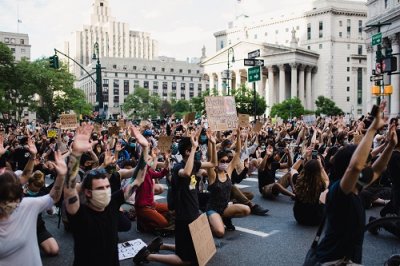 Unfortunately, the crucial need for ever-new modes of thought to adapt to new problems and situations in novel, humane ways is ignored by most individuals, and therefore by human societies at large. Short-term thinking and quick-fix solutions still rule the day, and we are therefore unprepared to deal with the complexities of the world we now face. The question of how to survive, let alone to thrive, is a question continually transforming itself. How can we adapt to reality when reality won’t give us time to master it before it changes itself, again and again, in ways we can but partially anticipate?
Unfortunately, the crucial need for ever-new modes of thought to adapt to new problems and situations in novel, humane ways is ignored by most individuals, and therefore by human societies at large. Short-term thinking and quick-fix solutions still rule the day, and we are therefore unprepared to deal with the complexities of the world we now face. The question of how to survive, let alone to thrive, is a question continually transforming itself. How can we adapt to reality when reality won’t give us time to master it before it changes itself, again and again, in ways we can but partially anticipate?  Traditionally, our thinking has been designed for routine, for habit, for automation and fixed procedure. We learned how to do our job once, and then we used what we learned over and over. But the problems we now face, and will increasingly face, require a radically different form of thinking, thinking that is more complex, more adaptable, more sensitive to divergent points of view. The world in which we now live requires that we continually relearn, that we routinely rethink our decisions, that we regularly reevaluate the way we work and live. In short, there is a new world facing us, one in which the power of the mind to command itself, to regularly engage in self-analysis, will increasingly determine the quality of our work, the quality of our lives, and perhaps even our very survival.
Traditionally, our thinking has been designed for routine, for habit, for automation and fixed procedure. We learned how to do our job once, and then we used what we learned over and over. But the problems we now face, and will increasingly face, require a radically different form of thinking, thinking that is more complex, more adaptable, more sensitive to divergent points of view. The world in which we now live requires that we continually relearn, that we routinely rethink our decisions, that we regularly reevaluate the way we work and live. In short, there is a new world facing us, one in which the power of the mind to command itself, to regularly engage in self-analysis, will increasingly determine the quality of our work, the quality of our lives, and perhaps even our very survival.